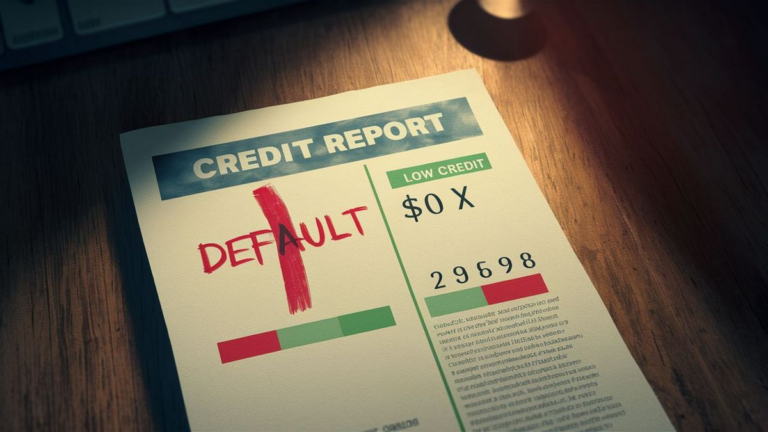When it comes to financial matters, few things can impact your future borrowing ability as severely as a default on your credit report. Defaults are red flags to lenders, indicating that you have failed to repay a debt as agreed. But just how bad is a default on your credit report? Let’s delve into the implications and consequences.
The Significance of Defaults
A default on your credit report can have serious repercussions. It signals to creditors that you are a high-risk borrower, making it challenging to secure loans, credit cards, or mortgages in the future. Lenders rely on credit reports to assess an individual’s creditworthiness, and a default raises significant concerns about your ability to manage debt responsibly.
Impact on Credit Score
One of the most immediate effects of a default is the negative impact it has on your credit score. Credit scoring models consider payment history as one of the most influential factors, and a default can cause a substantial drop in your score. This can make it difficult to qualify for favorable interest rates or credit terms.
Difficulty Obtaining Credit
Following a default, obtaining credit becomes significantly more challenging. Many lenders are hesitant to extend credit to individuals with a history of defaults, as they represent a higher risk of non-repayment. Even if you are approved for credit, you may face higher interest rates or less favorable terms.
Long-Term Consequences
The impact of a default can linger for years, affecting your financial stability and opportunities. Defaults typically remain on your credit report for seven years, making it difficult to rebuild your credit history during that time. Additionally, some creditors may require a clean credit history before considering you for new credit.
Difficulty Renting or Employment
Defaults can extend beyond the realm of borrowing, impacting other areas of your life. Landlords often check credit reports as part of the rental application process, and a default could hinder your ability to secure housing. Similarly, some employers conduct credit checks as part of the hiring process, potentially affecting your employment prospects.
Recovery Strategies
While defaults can have severe consequences, it’s not the end of the road. There are steps you can take to mitigate the impact and rebuild your credit over time. This may include paying off outstanding debts, negotiating with creditors, and responsibly managing new credit accounts.
Seeking Professional Assistance
If you’re struggling with defaults and their implications, seeking professional assistance can be beneficial. Credit counselors and financial advisors can provide guidance on managing debt, improving your credit score, and navigating the complexities of credit reporting.
In Conclusion
A default on your credit report is a significant financial setback with far-reaching consequences. It can impact your credit score, borrowing ability, housing options, and employment prospects. However, with proactive measures and responsible financial management, it is possible to recover from a default and rebuild your financial health.
Understanding Credit Repair
Credit repair is the process of improving one’s creditworthiness by addressing negative items on their credit report. This can involve disputing inaccuracies, negotiating with creditors, and implementing strategies to rebuild credit.
Disputing Inaccuracies
One of the first steps in credit repair is identifying and disputing inaccuracies on your credit report. Common inaccuracies include incorrect account information, erroneous late payments, or accounts falsely reported as delinquent. Disputing these inaccuracies with credit bureaus can lead to their removal, potentially improving your credit score.
Debt Settlement and Negotiation
For individuals struggling with overwhelming debt, debt settlement and negotiation can be viable options. This involves negotiating with creditors to settle debts for less than the full amount owed. While debt settlement may result in a negative impact on your credit initially, it can help resolve outstanding debts and pave the way for rebuilding credit in the long term.
Building Positive Credit History
In addition to addressing negative items, building positive credit history is essential for credit repair. This can be achieved by making timely payments on existing accounts, responsibly using credit cards, and diversifying credit types. Demonstrating responsible financial behavior over time can improve your credit score and overall creditworthiness.
Frequently Asked Questions
1. How long does a default stay on your credit report?
Defaults typically remain on your credit report for seven years from the date of the initial missed payment.
2. Can you remove a default from your credit report?
It is possible to remove a default from your credit report through various methods, such as disputing inaccuracies or negotiating with creditors. However, this process can be challenging and may require professional assistance.
3. How does a default impact your ability to get a mortgage?
A default can significantly impact your ability to qualify for a mortgage, as lenders typically view individuals with a history of defaults as high-risk borrowers. You may face higher interest rates or be required to make a larger down payment to compensate for the perceived risk.
| Impact of Default | Explanation |
|---|---|
| Difficulty Obtaining Credit | Lenders may be hesitant to extend credit or may offer less favorable terms. |
| Impact on Credit Score | A default can cause a significant drop in your credit score, making it challenging to qualify for credit. |
| Difficulty Renting or Employment | Landlords and employers may view defaults negatively, impacting housing and job opportunities. |
See also:






